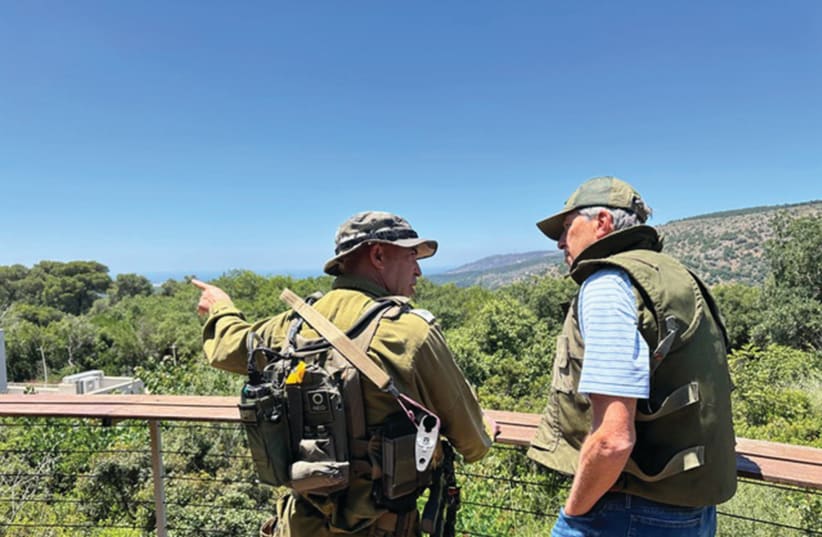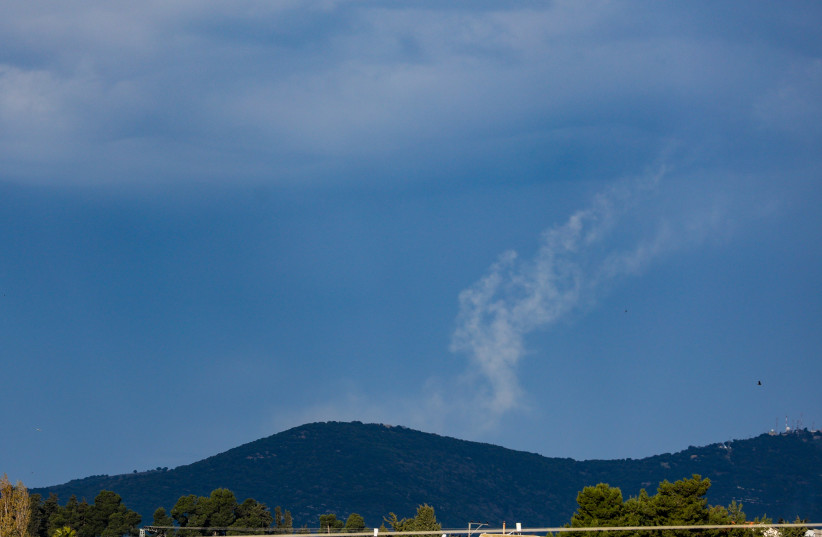I began writing this article from a shelter in an evacuated kibbutz on Israel’s northern border with Lebanon, as anti-tank missiles were falling near the road I had just traveled on – and in an adjacent community. The magnificent view of the Mediterranean, the smell of jasmine, and the beauty of the area contrasted sharply with this being a war zone. So began one of many days over the last seven months since October 7 that I spent in the North with combat soldiers, intelligence officers, and ordinary civilians.
This day, Hezbollah again used Russian-made anti-tank missiles to target Israeli civilians, a war crime to which Israel has yet to develop an effective response as the time to respond is short, and the trajectory of the missiles makes Iron Dome ineffective. A future answer is the laser-based Iron Beam system, which is still in development. Over the past few years, I reached out to Congress to educate them about investing in a laser defense system. It’s good to see that in a recent American security package, money was allotted for R&D, but more is needed.
Back to Israel’s North. Many kibbutzim and communities along the border with Lebanon have been evacuated from the Mediterranean Sea in the West, along the western Galilee border, up the peninsula of the Hula Valley, and farther east towards the Golan Heights. Cities like Kiryat Shmona, with 22,000 residents, have been evacuated, along with another 75,000 citizens along these border communities who have not been in their homes for over seven months. As the war has heated up, Hezbollah missile strikes have extended deeper into northern Israel, changing the rules of the game and making the chance for a mistake leading to a regional war even greater.
Much of the world is unaware of the situation in Israel's north
The world – preoccupied with the events in Gaza – has forgotten about the displaced Israelis of the North, whose family structures are being weakened, many of whose social interactions – the fabric of Israeli cohesion – are gone, jobs are lost, and communities are dysfunctional as their residents have been scattered throughout the country. Some Israelis are now questioning the wisdom of the evacuation order, while others say they will not return home until Israel can truly protect their children in the long run.
Israel chooses to prioritize the safety of their citizens, taking them out of harm’s way, while Hamas and Hezbollah use their civilians as human shields to create casualties that manipulate the world’s sympathies towards them. Horrific images screened to ignorant audiences are a powerful tool for terror organizations. It works very well as part of a strategy to make Israel a pariah nation, especially for those who were already predisposed against the Jewish state, like the United Nations, the European Union, and America’s progressive campus squads.
Israel’s prioritizing the lives of the forgotten displaced citizens of the North contrasts with their adversaries’ radical culture that uses the death of its civilians for an advantage, a true clash of civilizations.
Although America’s attention is on Gaza, the North is close to a tipping point for a major regional war. President Joe Biden is focused on the displacement of Gazan civilians and the impact on them of Israel’s Rafah operation. At the same time, the administration has been virtually silent in recent months about Israel’s citizens being forced out of their homes.
As I continue to write this article, I receive an alert of a terror incident in Samaria. The day before, I was there to receive a briefing and tour near a Hamas terror hub from a combat soldier. She told me about the staggering number of infiltrations and terror attempts that occur daily on Israel’s seamline next to Tulkarm and Kalkilya, two Palestinian cities bordering Israel’s narrow waistline.
Then, I was informed of a report of a suicide drone landing in a community that was the backdrop of my Instagram post reporting on the Northern War. Although the media have largely lost interest in the North, a genuine war is happening, and its potential to turn very hot, making Hamas’s capabilities look small in comparison, is a real possibility.
My day continues as I meet with reserve Israeli soldiers who live and defend their homes in the evacuated communities. I ask why they stay and defend their homes and how long they can remain motivated to fight as the war goes into its eighth month. They are not at their jobs as the CPAs, grocery store owners, doctors, educators, and Apple executives, but in uniform. Israeli reservists serve through their 40s and beyond.
“We have no place to go” and “It is our generation’s turn to step up” and fight for the survival of the Jewish people. The words purpose and meaning are often repeated when I ask the same questions of Israeli citizens throughout the country. One tells me he is optimistic for the future, even as a machine gun hangs across his chest.
Most Americans cannot relate to fighting in their own backyard but should be thankful for the Israeli sacrifice if they realize that this is one act of a long war against radical Islam, where Israel is the West’s front line. A future 9/11 may be out of the American imagination, but it is not out of the minds of radical Sunni and Shi’ite jihadists.
I have met many combat soldiers over the years, and what is remarkable about the ones I met on this trip, and other visits to Israeli combat zones since October 7, is that their ethical compass is so strong, despite the anger for what Hamas and Hezbollah have done. There is a striking clarity that their lives have meaning and purpose.
It is now late at night, and I pause to think about the pro-Hamas protesters on my college campuses with their warped morals and hatred of America and Israel, many profoundly ignorant. Then I think about the young Israelis who delay attending college to serve their country. Israelis are well aware of the protests, are puzzled by them, and ask me to explain how young Americans can be so hostile and ill-informed.
Instead of giving in to the demands of pro-Hamas protesters, American universities should be importing Israeli students, exemplars of genuine commitment to public service.
Good night from Israel’s northern border.
The writer is the director of MEPIN (Middle East Political Information Network) and Mandel Strategies, a consulting firm for business and government officials in the Middle East. He regularly briefs members of the US Congress and their foreign policy aides. He is the senior security editor for The Jerusalem Report and a regular contributor to The Hill.

